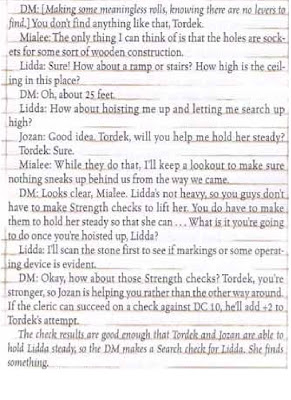I think this is great. Of course our game will be different - we will have a different DM and we will probably need to ask more questions, at least the first few times. But I encourage you to read through these to get a feel for actual gameplay. It goes to show you that your skill points actually do something. You may have been asking yourself, "Why the heck does it matter whether I have a +2 to Search checks? I mean that's great, but who cares?" Well, as you can see, it may be the difference between you finding a gem in a random pile of junk and just finding junk.
I apologize for the poor quality. I had to copy them as images from a PDF file. I blew them up as much as I could, so I hope you can read them. Enjoy!









9 comments:
1) OMG
2) OMG to Glamdring
when dude was making a "strength check" on the door... it seemed like since there was no time element he was allowed to assume a roll of 20.
Is that sort of thing common?
Yeah, there are two assumed rolls, either a 10 or a 20. If you decide to take a 20, that takes 20 times the amount of time it would normally take.
In the case of assuming a roll of 10, you would use that if it's a relatively simple task and there are no ongoing distractions (like climbing a rope up a cliff with no enemies around). Of course, if the DM says that your roll of 10 doesn't cut it, you have to actually roll the dice.
In this case, if you have unlimited time to try something (such as breaking down a door in an empty room) AND there are no negative penalties if you fail (for example, making a Jump check when trying to jump over a chasm - if you fail on that one, well, bad news for you), you can assume that you'll eventually roll a 20 and you don't have to bother rolling the dice 50 times.
Anything where the outcome is in doubt depending on the dice roll requires an actual roll. In this case it would be pointless so you can just say "I'm taking 20." Of course, if there's a giant evil Ferret-man on the other side of the door, the DM could rule that either you can't take 20 or that the Ferret-man interrupts you halfway through your attempt, breaks the door down for you, and eats your face, Anthony Hopkins-style.
Another example: let's take two different search checks.
On the first one, you've defeated all the enemies in the room and you're looking for a magic ring that you're supposed to find. You can take 20 because there's no time pressure. You can take all the time you want.
On the second one, you're at the end of a corridor (do you notice that hallways in dungeons are always corridors?) and you need to find a latch or lever to open the door while a group of zombies makes their way toward you. You can't take 20 on your search because there's not enough time. If you fail, you have to stop and fight.
word on it.
i feel like a majority of our characters enjoy the outdoors more than the dungeons. Do you think we can get like a "meadows and dragons" mod for our game so that we cruise most of the time through the great outdoors? I mean it's like druids and rangers and mounted pallys... oh my! you know?
although, being dark skinned should negatively affect enemies "spot checks" when i am rolling solo.
(did i apply the term correctly?)
I would say that you would get a bonus on a Hide check (opposed by an enemy's Spot check) if you were sitting naked in the dark...otherwise, not so much. Most paladins wear light colored clothing that would give you away.
But that was the correct use of the spot check. There's a definite difference between "spot" and "search." Spot usually refers to seeing other living things, especially when they're hiding while searching implies that you're looking in a specific area for a something of note.
Also, I think we'll do a lot of stuff outdoors, since that seems to be what our characters are good at. I would hope TC steers our encounters in that direction.
I read the ENTIRE thing and it was intriguing. This makes me more excited about this than I was.
Yay, our druid is excited! Now if only our rogue was so enthusiastic...
Post a Comment